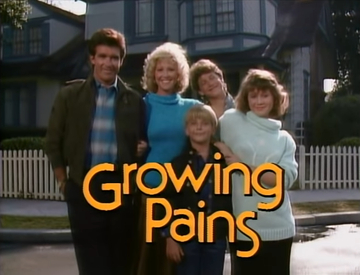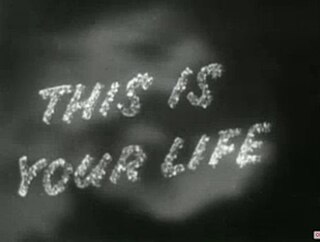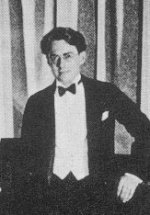Related Research Articles

Flower Pot Men is a British children's programme, produced by BBC television, first transmitted in 1952, and repeated regularly for more than twenty years. A reboot of the show called Bill and Ben was produced in 2001.

Growing Pains is an American television sitcom created by Neal Marlens that aired on ABC from September 24, 1985, to April 25, 1992. The show ran for seven seasons, consisting of 166 episodes.

Dragnet is an American radio, television, and motion-picture series, enacting the cases of a dedicated Los Angeles police detective, Sergeant Joe Friday, and his partners. The show took its name from the police term "dragnet", meaning a system of coordinated measures for apprehending criminals or suspects, although the word "franchise" should not be used in relation to it, as that word was not in use for more than a half century later.

I Love Lucy is an American television sitcom that originally ran on CBS from October 15, 1951 to May 6, 1957, with a total of 180 half-hour episodes spanning six seasons. The show starred Lucille Ball, her real-life husband Desi Arnaz, Vivian Vance, and William Frawley. It followed the life of Lucy Ricardo (Ball), a young middle-class housewife in New York City, who either concocted plans with her best friends to appear alongside her bandleader husband Ricky Ricardo (Arnaz) in his nightclub, or tried numerous schemes to mingle with, or be a part of show business. After the series ended in 1957, a modified version continued for three more seasons with 13 one-hour specials; it ran from 1957 to 1960. It was first known as The Lucille Ball-Desi Arnaz Show and later in reruns as The Lucy–Desi Comedy Hour.
Texaco Star Theatre was an American comedy-variety show, broadcast on radio from 1938 to 1949 and telecast from 1948 to 1956. It was one of the first successful examples of American television broadcasting, remembered as the show that gave Milton Berle the nickname "Mr. Television".
A miniseries is a television program that tells a story in a predetermined, limited number of episodes. The term "serial" is used in the United Kingdom and in other Commonwealth nations, though its meaning does not necessarily equate to "miniseries" in its usage.

This Is Your Life is an American reality documentary series broadcast on NBC radio from 1948 to 1952, and on NBC television from 1952 to 1961. It was originally hosted by its creator and producer Ralph Edwards. In the program, the host would surprise guests and then take them through a retrospective of their lives in front of an audience, including appearances by colleagues, friends, and family. Edwards revived the show in 1971–1972, and Joseph Campanella hosted a version in 1983. Edwards returned for some specials in the late 1980s, before his death in 2005.

Richard Diamond, Private Detective is an American detective drama, created by Blake Edwards, which aired on radio from 1949 to 1953, and on television from 1957 to 1960.

The United States Steel Hour is an anthology series which brought hour long dramas to television from 1953 to 1963. The television series and the radio program that preceded it were both sponsored by the United States Steel Corporation.

An anthology series is a radio, television, or film series that presents a different story and a different set of characters in each episode, season, segment or short. These usually have a different cast each episode, but several series in the past, such as Four Star Playhouse, employed a permanent troupe of character actors who would appear in a different drama each week. Some anthology series, such as Studio One, began on radio and then expanded to television.

Four Star Playhouse is an American television anthology series that ran from 1952 to 1956. Four Star Playhouse was owned by Four Star International. Its episodes ranged anywhere from surreal mysteries, such as "The Man on the Train", to light comedies, such as "The Lost Silk Hat". The original premise was that Charles Boyer, Ida Lupino, David Niven, and Dick Powell would take turns starring in episodes. However, several other performers took the lead from time to time, including Ronald Colman and Joan Fontaine.

Schlitz Playhouse of Stars is an anthology series that was telecast from 1951 until 1959 on CBS. Offering both comedies and drama, the series was sponsored by the Joseph Schlitz Brewing Company. The title was shortened to Schlitz Playhouse, beginning with the fall 1957 season.
Ford Theatre, spelled Ford Theater for the radio version and known as Ford Television Theatre for the TV version, is a radio and television anthology series broadcast in the United States in the 1940s and 1950s. At various times the television series appeared on all three major television networks, while the radio version was broadcast on two separate networks and on two separate coasts. Ford Theatre was named for its sponsor, the Ford Motor Company, which had an earlier success with its concert music series, The Ford Sunday Evening Hour (1934–42).

Cavalcade of America is an anthology drama series that was sponsored by the DuPont Company, although it occasionally presented musicals, such as an adaptation of Show Boat, and condensed biographies of popular composers. It was initially broadcast on radio from 1935 to 1953, and later on television from 1952 to 1957. Originally on CBS, the series pioneered the use of anthology drama for company audio advertising.

Tales of Tomorrow is an American anthology science fiction series that was performed and broadcast live on ABC from 1951 to 1953. The series covered such stories as Frankenstein, starring Lon Chaney, Jr., 20,000 Leagues Under the Sea starring Thomas Mitchell as Captain Nemo, and many others.

The Dennis Day Show is an American comedy/variety show that aired from 1953 to 1954 on NBC. The series stars singer and radio and television personality Dennis Day, whose career otherwise was rooted as a supporting cast member of the long-running The Jack Benny Program on CBS and later NBC.
Gang Busters was an American dramatic radio program heralded as "the only national program that brings you authentic police case histories." It premiered on January 15, 1936, and was broadcast over 21 years through November 27, 1957.
Four Star Revue was an American variety/comedy program that aired on NBC from October 4, 1950, to December 26, 1953.
On Stage is an American radio show also known as On Stage with Cathy and Elliott Lewis and Cathy and Elliott Lewis on Stage. It was an anthology program that aired on CBS for two seasons from 1953-1954.
References
- Dunning, John (1998). On the Air: The Encyclopedia of Old-Time Radio. Oxford University Press. ISBN 0-19-507678-8.